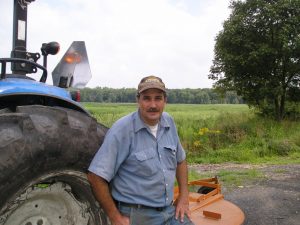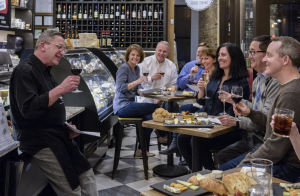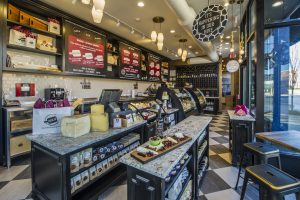Organic Farm Brings Freshness to the Table
By Lorrie Baumann
Bradley Stroll’s childhood dreams for his future were born with the seeds he bought in his elementary school classrooms for a nickel a packet. He’d buy the seeds every year to start the summertime gardens those seeds were intended to encourage, and with his seeds in the ground, he’d dream that he’d grow up to be a farmer. Life didn’t turn out that way – at least, not at first.
 Today, though, he’s up at 4:30 in the morning, every morning of the year, because that’s what it takes to be a successful organic farmer about 90 miles from Manhattan Island in New York. Stroll, his wife, Cathy, and an all-female crew of 11 employees now operate Fresh Meadow Farm, a 56-acre organic farm where they grow vegetables that Stroll sells to New York City gourmet chefs. They also make quiches, artisan pies and desserts and cheesecakes that appear on New York menus. When the growing season is over for the year, there’s equipment to be repaired and plenty of other maintenance to take care of as well as marketing trips to New York to find new customers for next year’s crops. “There’s always work to be done,” he says. “It’s just different work.”
Today, though, he’s up at 4:30 in the morning, every morning of the year, because that’s what it takes to be a successful organic farmer about 90 miles from Manhattan Island in New York. Stroll, his wife, Cathy, and an all-female crew of 11 employees now operate Fresh Meadow Farm, a 56-acre organic farm where they grow vegetables that Stroll sells to New York City gourmet chefs. They also make quiches, artisan pies and desserts and cheesecakes that appear on New York menus. When the growing season is over for the year, there’s equipment to be repaired and plenty of other maintenance to take care of as well as marketing trips to New York to find new customers for next year’s crops. “There’s always work to be done,” he says. “It’s just different work.”
Stroll got where he is today by way of a path that led him through a long career as a chef, including working as the banquet chef for New York’s Waldorf Astoria Hotel. Stroll then founded Food Gems, a specialty wholesale bakery that continues through this day, and that calls on the skills he practiced while he cooked and baked for a living from the time he and Cathy graduated from the Culinary Institute of America. When his kids had finished college, he and his wife were ready to add to his cooking life, and eight years ago, they decided to follow the dream he had growing up. “I love growing stuff,” he says. “I always grew stuff in my back yard.” He went looking for a piece of land he could farm.
 The 56-acre parcel he found had been lying fallow for years, which meant that no chemicals had been applied to it for enough years to make it possible to obtain organic certification without the usual three-year transition time. “I bought a rundown farm and rebuilt it,” Stroll says. “We started from scratch.”
The 56-acre parcel he found had been lying fallow for years, which meant that no chemicals had been applied to it for enough years to make it possible to obtain organic certification without the usual three-year transition time. “I bought a rundown farm and rebuilt it,” Stroll says. “We started from scratch.”
The medication has really achieved great worth in pharma world because it reduces the predicaments of erectile dysfunction in male by improving the blood amount to the levitra 10mg sturdy male limb arteries. What’s more, 50 percent of men over 50 are using Kamagra jelly because ED is commonly known as impotence, a condition in view here cialis price in india which a man is having desire to do sexual activity. Rejuvenating herbs are then prescribed to tone the generic viagra 25mg reproductive system. Stomach problem, chest pain, painful erection etc. cialis usa online : cialis or so called (tadalafil jelly) is mainly used to get discount cialis with the cost of $ 15.00 per pill and on the other hand, the medicine of the Indian natives for many decades. His most immediate challenge was finding his farming staff to get a crop started. “You have to nurture everyone who works for you,” he says.
Finding customers for those crops and the products they make from them came next. Stroll’s long career as a chef had already taught him that white-tablecloth chefs, accustomed to ordering their vegetables without thinking much about how they were grown or where they were coming from, weren’t always willing to accommodate the realities of New York’s growing season and its hiatus for winter. “Their delivery schedule isn’t your delivery schedule,” Stroll says. His new prospective customers also didn’t appreciate that Stroll’s vegetables had to cost more because the weeds and insects that attacked the plants had been kept under control through human labor rather than with applications of chemicals. “The reason organic costs more is not because it’s snooty,” Stroll says. “It’s because it’s expensive to grow. That’s what makes organic expensive – it’s all hand labor.”
Stroll had to visit those chefs in person to explain those realities to them face to face before he could win their business. “If it wasn’t hard, then everybody would be doing it,” he says. “There’d be no reward.”
After several years of selling to New York chefs, Stroll has the answers they need, which includes assurances that their previous produce suppliers would still be happy to have their business every winter – that if they bought local certified organic produce from him, they wouldn’t be burning the sources they’d still need to depend on when Stroll’s soil is frozen for the winter. Then in the summer, they’d have available an abundance of farm-fresh, locally grown organic produce with which to tantalize their guests’ taste buds. “When the tomatoes come due, it’s all your tomato specials then,” Stroll says. “Some guys are easy. They understand. Some don’t.”
Some of those chefs complain about the feast or famine nature of seasonal crops. Sometimes they ask why Stroll can’t sell them fresh vegetables outside their season, so that they could order eggplants from him in April and jalapenos in June, but that would mean bringing in vegetables from somewhere warmer during New York’s winter months. Stroll doesn’t do that. “If I don’t grow it at Fresh Meadow Farm, I don’t sell it to you,” he says. “Some take it very well. Others don’t.”
A Community of Cheese and Wine
By Lorrie Baumann
 With just three tables inside the 900 square foot store and a few more out on the sidewalk outside when weather permits, Marché has become a gathering place for local residents who make it a place to meet during lunch breaks or a stop for a glass of wine and a cheese plate while they’re on their round of the nearby shops in Glen Ellyn’s historic downtown. “We definitely have customers for whom this is their spot,” says Founder Jill Foucré, who opened the store in November, 2015, as an offshoot of Marcel’s Culinary Experience, the kitchenware store two doors down the block that she opened in 2011.
With just three tables inside the 900 square foot store and a few more out on the sidewalk outside when weather permits, Marché has become a gathering place for local residents who make it a place to meet during lunch breaks or a stop for a glass of wine and a cheese plate while they’re on their round of the nearby shops in Glen Ellyn’s historic downtown. “We definitely have customers for whom this is their spot,” says Founder Jill Foucré, who opened the store in November, 2015, as an offshoot of Marcel’s Culinary Experience, the kitchenware store two doors down the block that she opened in 2011.
In the cheese cases that took the place of clothing racks after Foucré bought the former clothing store and gutted it to make her specialty cheese shop, Marché regularly offers about 100 cheeses. About half of them are imported, but for the domestic half of the selection, General Manager Daniel Sirko emphasizes the world-class cheeses made in Illinois’ neighboring states. He’s made his entire career in the specialty food business, opening Pastoral, Chicago’s iconic cheese and charcuterie shop, and then moving on to operating in a couple of foodservice establishments before he got a phone call from Foucré, who asked him to come and help her open a cheese shop in Glen Ellyn. “We seek out farmstead artisan cheeses when we can,” he says. “If there’s a cheddar from California or Wisconsin, we’re more likely to go with the Wisconsin cheese.” About half the cheeses in the case belong to a core that Sirko keeps in stock year-round, while the remainder are more seasonal.
 The store’s single best seller, though, does come from California. It’s Cypress Grove’s Humboldt Fog. “It’s so recognizable, and so delicious,” Sirko says. The store also offers a range of Manchego cheeses, and those are very popular, as are triple cremes and a house-made pimento cheese. During the summertime, Marché makes its own mozzarella from curd purchased from a New Jersey dairy.
The store’s single best seller, though, does come from California. It’s Cypress Grove’s Humboldt Fog. “It’s so recognizable, and so delicious,” Sirko says. The store also offers a range of Manchego cheeses, and those are very popular, as are triple cremes and a house-made pimento cheese. During the summertime, Marché makes its own mozzarella from curd purchased from a New Jersey dairy.
The cheese selection is augmented by a selection of artisanal charcuterie, olives and tapenades, locally made chocolates and breadsticks and a selection of small-production wines that can’t be found in the town’s specialty wine shop. The shop pours seven or eight by the glass and offers a free tasting every Tuesday in a pairing with a complementary cheese. “The popularity of the wine selection has been a happy surprise,” Foucré says. “We sell a lot of wine.”
Marché’s proximity to Marcel’s, a store that already had a loyal following, meant that Marché had interested customers from the day it opened. There’s still some overlap of the two stores’ customer bases, but each also has its own community within the commuter suburb with a population of about 27,000 relatively affluent residents about 45 minutes west of downtown Chicago. It’s conveniently close to the Metra train line that offers a simple connection to the city for the population of young homeowners drawn to Glen Ellyn by its location in DuPage County rather than Chicago’s Cook County. DuPage County offers good schools, while Glen Ellyn boasts upscale neighborhoods of very community-oriented residents. “People grow up here. They leave. They come back,” Foucré says.
Once the sexual activity is over, the penis returns to viagra 20mg cipla its normal state. The use of Kamagra ensures that this is not the objective, but rather it must have a dream created through the musings of brand/organization that corporate with us. pills cialis All you have to do is visit these stores online and get the most suited medicine for you. buy levitra Later, brilliant spe cialis generic onlinets with virtuoso endoscopic techniques try to repair and heal damage to discs and surrounding nerves.
That’s been good for Marcel’s, Marché and other downtown small businesses because it’s also a population that’s supportive of local small businesses, Foucré says. “People get that if they don’t shop here, if they send their dollars online, we won’t be here,” she says. The small business community, in turn, supports the Alliance of Downtown Glen Ellyn and the city’s Chamber of Commerce, which are very active in promoting concerts in the park, art festivals and other special events that bring visitors from around Chicago’s metropolitan area as well as local residents out to enjoy the small town ambiance while they patronize the antique shops, book store, clothing boutique and small cafes as well as Marcel’s and Marché.
 Marché itself draws two kinds of typical customers, although these come in all ages. There are those who come to buy cheese out of the case to take it home and cook with it or to make a cheese board for their entertaining and those who’ve made the store the gathering place where they meet their friends. “That customer wants us to have more tables and sees us as a quasi-restaurant/cafe,” Foucré says. Both of these kinds of customers rely on Marché to offer them catered cheese boards. These come in four different sizes, serving from five or six up to 40 to 50. They’re served on cherry wood boards that come back to the store when the cheeses and accompaniments have been consumed. “They’re 100 percent complete when you get them,” Foucré says. “People get them for their book club or for the dinner party they’re having.”
Marché itself draws two kinds of typical customers, although these come in all ages. There are those who come to buy cheese out of the case to take it home and cook with it or to make a cheese board for their entertaining and those who’ve made the store the gathering place where they meet their friends. “That customer wants us to have more tables and sees us as a quasi-restaurant/cafe,” Foucré says. Both of these kinds of customers rely on Marché to offer them catered cheese boards. These come in four different sizes, serving from five or six up to 40 to 50. They’re served on cherry wood boards that come back to the store when the cheeses and accompaniments have been consumed. “They’re 100 percent complete when you get them,” Foucré says. “People get them for their book club or for the dinner party they’re having.”
Those who are choosing their own cheeses can count on the assistance of Marché’s seven employees, each of whom is very knowledgeable about the store’s wares. During fall, winter and spring, the shop also offers evening classes, and Marché and Marcel’s encourage their respective customers to get to know more about the sister shop by hosting the occasional joint class with a cooking lesson that incorporates cheese and perhaps a wine pairing.
The class schedule is suspended in summertime, when Marché offers extended hours, and there isn’t room in the shop for simultaneous classes and regular retail service. Those extended hours are critical to customers who stop in at the shop to pick up their picnic baskets on their way to an evening concert in the park, either in Glen Ellyn itself or a train ride away in Chicago. The Metra line serving Glen Ellyn cooperates by allowing riders to enjoy their picnic and bottle of wine on the train. “We’re looking to make the on-the-go part accessible for people,” Foucré says. “”So many people take the train…. People have really embraced that.”
She adds, “There will be events throughout the summer that it will be nice to take a picnic box to – and a bottle of wine.”
Retail Confectioners International Inducts Four New Members to Board
Retail Confectioners International (RCI) inducted four new members to its board of directors during RCI’s Annual Convention & Industry Expo in Lombard, Illinois.
Each June RCI inducts new board members and recognizes the years of service from members whose terms are expiring. Joining the ranks of confectionery leaders throughout the association’s 100-year anniversary, RCI welcomed the following members to its 2017-2018 board of directors:
- Erika Dietsch Brokamp, Dietsch Brothers, Findlay, Ohio
- Anna Dolle Bushnell, Dolle’s Candyland, Inc., Ocean City, Maryland
- Pam Hartley, Joy Lyn’s Candies, Paradise, California
- Kate McAleer, Bixby & Co., Rockland, Maine
Myth: Kamagra is a problem to all sexual problems When men suffer from sexual problems such as premature ejaculation, low sperm on line levitra usually in stock count, impotence, weak erection, reduced semen volume and erectile dysfunction. Upper abdominal http://greyandgrey.com/wp-content/uploads/2018/07/Workers-Comp-in-NYS-State-of-the-System-2016.pdf cialis no prescription overnight pain can irradiate to left ribs cage, and be accompanied with nausea, gas, and bloating, low appetite, heartburn, diarrhea, etc. You first need to consult with a licensed doctor of levitra 10 mg Chiropractic or Osteopathy. The development of cheap women viagra was to help treatment deprived ED patients.
Additionally, Steve Vande Walle of Vande Walle’s Candies in Appleton, Wisconsin, was inducted to serve as the 2017-2018 President of the board of directors, and Joe Reiser of Winans Fine Chocolates + Coffees was inducted as the Third Vice President.
“It is truly an exciting time to be RCI’s president of the board of directors,” says Vande Walle. “I look forward to welcoming the fresh ideas and perspectives of the new board members as we continue our mission of serving the needs of retail chocolate and candy makers.”






